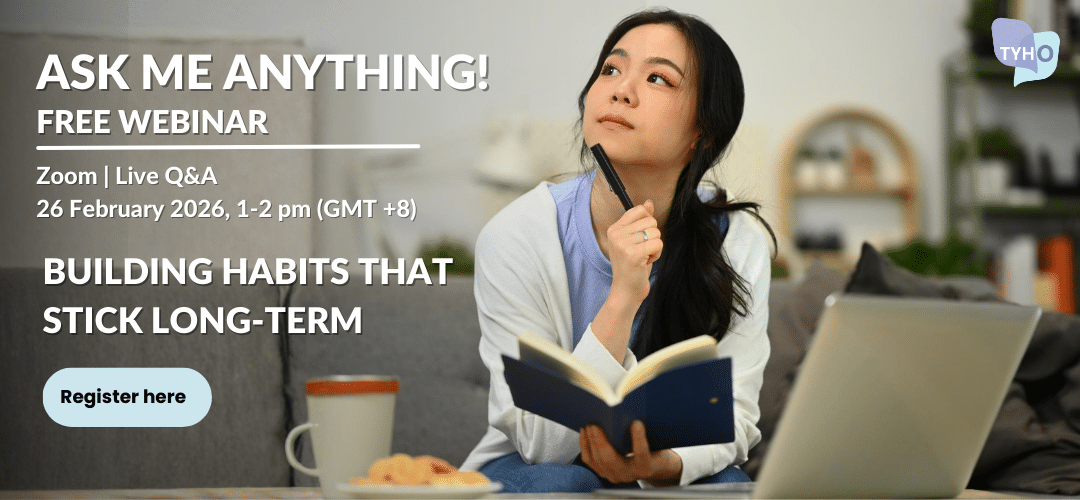Child Psychologists in Singapore
Find a qualified child psychologist today!
At Talk Your Heart Out (TYHO), we help kids who struggle to make themselves heard. Receive a personalised therapeutic plan from a qualified child Therapist in Singapore.
- Singapore-based counselling platform
- 98% of our clients would recommend TYHO
- Strict selection process with 10% acceptance rate for counsellors
- Online & In-person (various locations)
- 70+ vetted & multicultural counsellors in Singapore
- Same day & after hours (incl weekend) sessions available

Child Psychologists Featured for You
At TYHO, we have child psychologists in Singapore who offer both online and offline therapy sessions.
Please click the ‘View Profile’ link to explore our child psychologist’s profiles, approaches, and issues they can help with, and watch their short videos.

Karan
Counsellor
Karan provides counselling to individuals facing health-related issues, neurodevelopmental conditions, parental stress, depression, and trauma.
Starting from S$ 239.80 (w/GST)

Anusha
Counsellor
Anusha is an experienced individual and couples counsellor for various age backgrounds facing anxiety, stress, depression, anger management, and childhood trauma.
Starting from S$ 130.80 (w/GST)

Helen
Psychologist
- TYHO Room (City Hall)
Helen can help individuals and couples with life transitions, anxiety (incl social anxiety), work-related stress or burnout, communication problems, and fears or phobias.
Starting from S$ 174.40 (w/GST)
What Is Child Psychology?
As a parent, your child’s wellbeing is probably your top priority. If you’re seeking help for your child, you may be looking for a child psychologist. But what is child psychology, what exactly does a child psychologist do, and how can you tell if your child needs one?
Child psychology is a specialised field of study within psychology. It focuses on children’s mental, emotional, and social development from birth through adolescence.
Child psychologists understand the complexities of a child’s mind – how they think, feel, and interact with the world around them.
To understand their developmental progress, TYHO psychologists observe children’s behaviour patterns, emotions, and thoughts.
During kids therapy, you may explore various aspects like learning abilities, cognitive development, emotional growth, and social interactions.
Your understanding aids in diagnosing and managing various developmental, emotional, and behavioural issues such as attention-deficit hyperactivity disorder (ADHD), autism, anxiety, and depression.
What do child psychologists do?
At TYHO, our Singaporean child psychologists are experts in helping your children and family members identify and manage emotions and teach healthy coping skills.
More specifically, your child psychologist may assess, diagnose, and manage your child’s emotional, behavioural, and mental health issues.
During therapy, the online child psychologist may use several therapies, such as talk therapy, play therapy, and cognitive behavioural therapy (CBT).
Regardless of the type of approach, your Therapist in Singapore may modulate the techniques to make it easier to understand and appropriate for children.
Occasionally, your child psychologist may use an eclectic approach (eg drawing from multiple modalities) to help your child solve problems and learn healthy habits.
TYHO child psychologists have intense training and skills to evaluate and help their clients regardless of age – including infants, children, and adolescents.
Furthermore, psychologists also have an in-depth understanding of children’s basic and psychological needs and how their environment and cultural contexts influence their:
- Interpersonal adjustments
- Developmental processes
- Behavioural adaptations
Child psychologists in Singapore use psychological interventions like behaviour management and prevention programs (eg motivational interviewing) and develop strategies to prevent bullying, addictions, and teen pregnancy.
Therapeutic plans for children usually vary from treatment for adults due to differences in age, maturity, and cognitive levels.
Hence, your child psychologist may provide care based on your child’s medical, family, and mental health history.
At TYHO, we have child psychologists who offer both online and offline therapy sessions. Regardless of the modality, all your sessions will remain strictly confidential.
How do I know if my child needs help?
Children very commonly go through several issues as they navigate their way through childhood and adolescence.
However, most children do not know how to share their feelings or how to identify that there is a problem in the first place.
Therefore, certain behaviours or thoughts might indicate a deeper issue rather than the child just ‘going through a phrase’.
Hence, it might be helpful to seek professional support if you notice any unusual signs or symptoms in your child’s behaviour or thought patterns.
Here’s what to look out for:
- Constantly feeling sad or withdrawn: During teenage years especially, children might experience drastic mood swings and occasional sadness. However, if your child seems to be sad all the time, irritable and withdrawn even without any obvious problem, it might be an indication of their struggle.
- Drastic changes in academic performance: Every child has different levels of understanding and cognitive skills. Hence, it is important to only focus on sudden performance changes rather than evaluating their regular intellectual abilities. For example, notice if the grades drop suddenly (especially if your child usually scores high) or complain about going to school even if they previously enjoyed their time there.
- Changes in sleep or appetite: If your child experiences sudden changes or disturbances in their sleep (eg unable to fall asleep or sleeping excessively), or goes through dramatic shifts in their eating habits, your child might have an underlying issue.
- Intense emotions: If your child has strong feelings of fear, worry, or anxiety that prevent them from participating in activities they previously enjoyed – it could indicate that your child may need help.
- Difficulty concentrating: If your child has trouble paying attention or constantly acts impulsively, it might suggest they need help.
Every Child is Unique
Every child is different, and what might seem like an issue in one child might not be so much of a problem in someone else.
For example, some children may avoid engaging in activities they enjoy because they are shy or awkward.
On the other hand, some children might have mental health issues such as social anxiety.
Hence, it is important to focus on what your child is specifically going through. If you conclude that your child’s behaviour is out of the ordinary or need help in understanding what’s going on, you might benefit from kids therapy in Singapore.
Alternatively, you can even choose to go to individual counselling in Singapore if you are facing parental stress or would benefit from stress management tools.
Taking Your Child to a Psychologist
Online child psychologists at TYHO have the expertise to manage and address several issues, including mental health challenges and behavioural problems.
Some of the most common issues TYHO psychologists can help with include:
- Anxiety: Anxiety can manifest in many forms. Some of the common disorders include social anxiety, generalised anxiety disorder, and specific phobias.
- Depression: Children and teens can also have depression, yet it may often go unnoticed because of a lack of articulation and understanding. Common symptoms could include feeling sad all the time, throwing ‘tantrums’ (eg not eating or sleeping), and having no energy to play.
- Behavioural issues: Children with behavioural issues may struggle with impulsiveness, aggression, defiance, or other harmful and maladaptive habits. Although traits like impulsiveness and anger are not inherently bad, if your child does not know how to manage them – it may cause further problems like self-harming tendencies. During these cases, anger management can also help you.
- Learning disabilities: Children with learning disabilities may struggle to read, write, or score well in exams. Addressing these problems early and accommodating their needs can help them have a positive academic experience.
- Trauma and abuse: Children who have experienced trauma or abuse may struggle with feelings of fear, anger, guilt, or shame. In this case, child psychologists at TYHO can provide therapy and support to help these children work through their emotions.
At TYHO, your child psychologist may help your child by creating a safe environment where they can express their thoughts and feelings.
For example, some children may fear talking about certain emotions, such as anger or disappointment.
However, during therapy, the child psychologist may use effective tools such as dialogue prompts to help your child accept their emotions.
Through therapy, children can learn:
- Healthy coping skills like journalling or mindfulness
- Better understand themselves and their emotions
- Develop and maintain healthy relationships
The process of therapy is usually the same in both offline and online child therapy. Initially, the child psychologist may focus on making your child feel comfortable by asking them casual questions about their life and general topics.
Below is a non-exhaustive list of things they can help your child with:
Child psychologists at TYHO are trained to help kids who struggle with issues such as anxiety, depression, attention-deficit / hyperactivity disorder, or maladaptive behaviours.
During therapy at TYHO, your psychologist may work with your child to:
- Understand the root causes of issues
- Help the child in developing strategies to manage their symptoms
A child can develop trauma due to several factors, such as abuse, neglect, or the lack of family support.
A child psychologist thus guides these children in processing their negative experiences and picking up healthy coping methods.
Child therapy plays a vital role in bringing back joy and happiness into the lives of these children.
Sometimes, your family may struggle with issues that directly or indirectly affect your children.
The family issues can be something unavoidable, like relocating to another country, or even major life changes like divorce.
A family member’s illness might also influence the child.
Given these situations, child psychologists can help you and your family work through these challenges and create a supportive environment for your child.
If your child struggles in school or with reaching developmental milestones (eg difficulty in verbal communication or comprehending information), your child can benefit from counselling sessions.
In particular, speaking with a child psychologist can help your child identify learning difficulties they may be experiencing and navigate through their problems in a safe setting.
If you’re not sure whether your child needs to see a child psychologist, here are some signs to look out for:
- Difficulty with developing or maintaining relationships
- Sudden and constant changes in mood or behaviour
- Decline in school performance or extracurricular activities
- Excessive worry or fear
- Difficulty sleeping or waking up
- Aggressive or self-sabotaging behaviours
Your initial meetings with a child psychologist may raise questions or concerns as you are unfamiliar with the therapeutic process.
We have been there and want to help you with this process. Before your child attends their first session, you might want to clearly understand the psychologist’s approach and your child’s needs and goals.
For instance, some helpful questions to ask them include:
- What is your education, training, and experience working with children and adolescents?
- How do you approach therapy with children, and what techniques do you use?
- How do you work with parents and families in therapy?
- How do you determine if my child is making progress in therapy?
- How do you address my concerns about my child’s therapy?
- How often do you see children for therapy sessions, and how long does a typical course of treatment last?
- Can you provide references from other parents or professionals in the field?
- What is your policy on confidentiality, and how do you handle sensitive information?
- Are you familiar with any specific disorders or issues my child might face, and how would you approach their treatment?
- How do you handle emergencies or crises outside of regular therapy hours?
In essence, these inquiries can help you make an informed decision about a child psychologist and ensure the best possible outcome for your child’s journey in therapy!
Frequently Asked Questions
To choose a child Therapist, please visit the link here: https://app.talkyourheartout.com/.
You can choose options such as issues you need help with, gender of the Therapist, therapy mode and type of service to view the filtered list of professionals.
As the next step, try to click on the full profiles of each child Therapist in Singapore to read about their qualifications and specialisations. You can also watch their short videos to learn more.
Lastly, you can reach out to us via email at [email protected] or via WhatsApp (click the icon in the bottom right) if you need help selecting an online child Therapist in Singapore.
During the first few sessions, your child psychologist may focus on making your child feel more comfortable and relaxed.
Developing a positive therapy relationship may include talking about the child’s interests, playing games, or simply chatting. As the session progresses, the psychologist may guide your child in exploring their thoughts, feelings, and behaviours.
To do so, the psychologist may use therapeutic tools such as art therapy (eg drawing, painting, singing, or acting). Expressing emotions through art could help your child label their emotions better.
Above all, TYHO psychologists in Singapore may gently guide your child to express themselves freely and openly throughout the session.
At TYHO, our professional Therapists use a holistic approach, which means that the Therapist may address issues in various life aspects, such as academics, friendships, relationships with family, interests, and hobbies.
How long your child needs therapy may depend on several factors, such as the intensity of the issue, your child’s age, personality, and their responses and engagement in therapy.
Some children may find the process of therapy hard to understand and, thus, react more slowly to the exercises and activities.
On the other hand, some children may be quick to adapt and work on exercises recommended by their child psychologist in Singapore.
A slow or fast response says nothing about your child’s abilities during therapy. It simply means that every child is different and may resort to different reactions based on their upbringing, culture, and personality.
Try to discuss openly with your child psychologist to determine the duration and frequency of therapy sessions.
During the discussion, also enquire about when you can expect to set goals and see progress for your child.
At TYHO, all therapy sessions last for 60 minutes.
How can parents help?
If you are a parent, you can help your child in several ways:
- Support: Encourage your child during therapy and constantly remind them that it’s okay to talk about their feelings.
- Consistency: Make sure to attend therapy regularly. Routine can help the child become more familiar with their psychologist and the process of therapy. Once your child is comfortable, they may even start opening up about their problems.
- Communication: Maintain open communication with the psychologist in Singapore. Share any changes or concerns you’ve noticed in your child’s behaviour.
- Home practice: Use the exercises your Therapist suggested. This might show the child that you are also willing to put in the effort and that it’s normal to engage in the activities outside therapy sessions as well.
- Model healthy behaviour: Show your child healthy ways of handling stress and conflict. For example, if you are angry, try to explain yourself to your child instead of shouting or bursting out.
- Educate yourself: Learn more about your child’s challenges and how child therapy works to better understand and support them.
Remember, it’s a team effort, and you’re an essential part of your child’s therapy.
Not Ready for Kids Therapy?
We understand! While you’re contemplating, feel welcome to engage with our supportive network at Talk Your Heart Out.
In our community, we regularly share informative and thought-provoking content through blog posts that delve into various aspects of psychology.
Plus, we host free interactive webinars and events that offer practical advice and tips for nurturing your child’s mental well-being.


